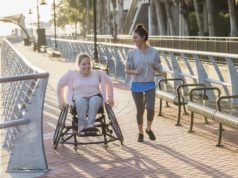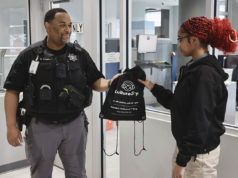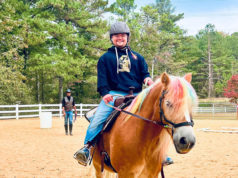Mental health counselor Dr. Brandy K. Nicholson helps clients move forward.
By Alexandra McCray
On weekday afternoons and evenings, while most of us are winding down our days, Brandy K. Nicholson, Ph.D., LPC, NCC, CCMHC, RPT, is in her Acworth office helping people process some of the most difficult moments of their lives.
As a licensed professional counselor, national certified counselor, certified clinical mental health counselor, and registered play therapist, Nicholson specializes in assisting adults, teenagers and children dealing with trauma, anxiety disorders, and depression. Additionally, she is trained in eye movement desensitization and reprocessing (EMDR), and anchors her practice, Bridging the Balance, LLC, in addressing the mind, body, and soul. “I am an Adlerian therapist [a short-term, goal-oriented, and positive psychodynamic therapy] who believes we all need to belong and feel significant. How do we find that value and significance in life? And when we don’t, how do we handle it? Do we handle it in healthy ways or in unhealthy ways?” she says.
Approaches for change
One way Nicholson helps her clients address those questions in relation to trauma is EMDR. She explains, “As part of EMDR — which is a distinct and unique type of therapy that includes bilateral stimulation, such as eye movements, hand taps, and auditory tones — clients can access negatively stuck memories, process the traumatic events, and then see them in a new way and no longer be overwhelmed or triggered by them.”
She says that an important distinction of EMDR is that clients do not have to recount every part of an experience. “The beauty of EMDR is that you don’t have to relive the trauma. You don’t have to tell me the entire trauma history. A lot of clients want to, and they need to talk it out, and that’s OK, but they really don’t have to,” Nicholson explains. “We just have to get to what is that negative cognition surrounding what brought them to therapy in the first place. What’s that thought — ‘I’m not in control.’ ‘I’m not safe.’ ‘I’m not good enough.’ — that’s tied to this traumatic event?”
Tools used for the treatment can range from two fingers that the clinician holds up and moves from side to side to a light bar that provides a similar changing focal point (and relief for strained clinicians’ arms). Nicholson says, “I also have tappers that provide bilateral stimulation through vibrations with LED lights. Some clients who can’t do the eye movements use the headphones [for auditory tones] and the tappers. And what all of this is doing is providing the bilateral stimulation of the brain needed to process traumatic events.”
Nicholson also encourages clients, especially those with trauma, to practice yoga. While pursuing her Ph.D., she learned that it could increase heart rate variability (HRV), which measures the changes of time in between heartbeats. She says, “So, the greater that fluctuation, meaning good HRV, the better a person can function, the better their balance and arousal systems, and [they experience] fewer negative effects on thoughts, feelings, and how the body responds to stress.” She also now owns an emWave® Pro Multi-user device, which monitors HRV, that she plans to use with clients.
Nicholson opened her counseling practice in January of 2019 and then launched a yoga studio in her old office suite next door in 2020. Though she wasn’t a yoga teacher at that point, Nicholson was spurred to create the studio after experiencing firsthand how yoga and its associated breathwork and mindfulness helped with stress, and continually telling her clients to explore it. Today, she is a certified yoga instructor (RYT® 200-certified).
Classes aren’t currently offered at the studio, but Nicholson is considering holding one on Saturdays. In Cartersville, however, she currently teaches one class a week that is complimentary for seniors who are members of the senior center where it’s held. Area schoolteachers also can attend for a discounted price. Her goal is for her studio to one day offer classes from multiple perspectives, including a Christian one.
Finding her path
Today, adults make up most of Nicholson’s counseling practice clientele, and lately many of those reaching out to her are nurses, police officers, and other people whose work involves high-stress situations. But she began her career in counseling with the goal of mainly working with children.

After more than 20 years in banking and accounting, she enrolled at Liberty University in 2007 to study religion. Upon later realizing her passion for psychology and learning about the brain, Nicholson decided to pursue an associate degree in psychology, which was followed by a bachelor’s degree, and then a master’s in marriage and family therapy.
While interning and following graduation with her master’s degree, Nicholson was able to work with children by working with the Georgia Division of Family & Children Services (DFCS). She says it gave her excellent experience but was incredibly difficult and left her discouraged. Nicholson continued forging ahead in gaining her license, though, and simultaneously became an elementary school counselor in Bartow County, a role she still holds.
Ultimately, it was discovering the book “The Body Keeps the Score” in 2019/2020 while acquiring her Ph.D. (from another university) in counselor education and supervision with a specialization in leadership that radically changed the direction of Nicholson’s work. “It’s so detailed about the brain and how it functions, and your emotional brain and your rational brain and what happens when you experience trauma, where it gets buried and all those things,” she says.
Among other insights, the book helped her comprehend what drives people to abuse substances and gave her a clearer understanding of traumatic events from her own life. She says some of the most powerful chapters were on the effects of trauma on the brain and how impactful EMDR and yoga are for trauma treatment. After finishing the tome, Nicholson began to intensely explore the research on both and switched her dissertation topic to treating trauma in children and the role of mindfulness. She then went on to become trained in EMDR, which involved her receiving the treatment personally.
Nicholson’s current training focus is on counseling for emergency workers. She is considering becoming a Certified First Responder Counselor (CFRC) and receiving training from Force Science Institute. “Whatever population you’re working with, they have to trust you,” she says. “…Working with first responders is the same thing. They’ve got to know they can come in here and think ‘I’m going to be safe. It’s not going to make it back, and I’m not going to get fired because of it.’ Same thing with the military population, which is another area that I may work with,” she says.
Nicholson explains that while clinicians may have different techniques they use, it all comes down to creating a safe place for clients to release the heaviness of life, learn to ride the waves of their emotions, and know that they do not have to do it alone.
To learn more about her counseling practice, visit BridgingTheBalance.com, and to get yoga studio updates, go to BridgingTheBalanceYoga.com.




